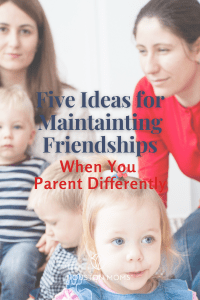 Maintaining adult friendships after you have kids is hard. There are dynamics that are sometimes difficult to manage, including differences in how you and other moms choose to raise your kids. I am no expert, but I do have some tips on how I navigate situations with my friends who parent differently than me.
Maintaining adult friendships after you have kids is hard. There are dynamics that are sometimes difficult to manage, including differences in how you and other moms choose to raise your kids. I am no expert, but I do have some tips on how I navigate situations with my friends who parent differently than me.
My friend is struggling and I think I can help.
Unsolicited advice is one of the worst things parents have to deal with. If a friend did not ask for help or advice on a matter, the best thing to do is let them know you are there to support them in whatever way you can. If you believe your way could solve their issue, then broach the subject in a general way and present your solution as one of several options. If your friend tries your solution, GREAT! If not, let it go.
My friend is giving me unsolicited advice on my parenting.
Some people are ok with unsolicited advice, and if you’re one of those people this is not an issue for you. If however, your immediate reaction is to get defensive, you need to set a boundary. You could say, “I have read/tried it all, and I am not looking for solutions. I just need a friend who will listen”. If setting boundaries with friends makes you uncomfortable, then maybe avoid discussing parenting altogether.
I’m dropping my child off for a playdate with my friends.
Set some ground rules before the playdate begins on things like discipline or snacks. You could say something like, “If my kid does XYZ, please try to handle it in this way”, or “We have a hard limit on snacks with sugar; here are some snacks just in case you don’t have any on hand”. It is better to be clear in order to avoid misunderstandings and confusion. When intentions are misunderstood, the hurt feelings can be much longer-lasting.
My friend is doing something that could cause harm.
There is so much new information out there in terms of child development, yet it is practically impossible for any one parent to keep track of them all. If you see a friend doing something that could potentially cause harm {i.e using a product that most professionals no longer recommend} should you say something?
This is a tough situation to navigate, but yes, you should say something, but with sensitivity. You could say something like, “I recently read something about that product; let me share the information with you.” Never go on the offense; always come from a place of empathy and understanding.
I love my friend, but his/her kid is not my favourite
This can be the most challenging issue to navigate with friendships when you parent differently. Maybe you aren’t quite ready to have this child around your child because children follow their peers, or maybe you just don’t want to deal with having this kid around. Different parenting choices can mean the children react very differently in social situations.
The easiest way to keep your friendship is to avoid playdates or situations where the kids have to come around. Make all plans around adult-only situations. The tougher option is to have a frank conversation about their child, but only take this path if you are willing to lose your friendship entirely. I don’t say this lightly. Try to imagine someone telling you how bratty your child is, and think about how you would react?
I hope these tips help you navigate the tough world of maintaining friendships when you parent differently. Also, a simple hug and a shoulder to cry on can go a long long way when it comes to having difficult conversations, and a glass of wine doesn’t hurt either.













